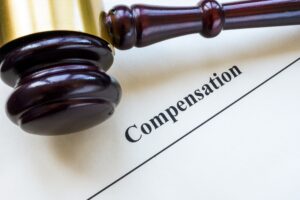Unlike standard traffic accidents involving cars and trucks colliding with each other, motorcycle accidents carry a much greater risk of significant, life-altering injuries. In the aftermath of a motorcycle accident, victims often face a lengthy physical recovery period, leading to expensive medical bills, lost income, and other damages. One type of damages sought following an accident that can sometimes be ambiguous is pain and suffering. What is considered pain and suffering? How is it calculated? These are important questions to get answered when you’re left picking up the pieces after a motorcycle accident.
If you or a loved one has suffered an injury in a motorcycle accident, you need to explore every option to obtain relief from the financial burden you are carrying. With the guidance provided by a skilled personal injury lawyer with experience in helping people in motorcycle cases, you can build a strong strategy that will allow you to pursue the resolution you need — including potential compensation for pain and suffering.
Please continue reading below to learn about motorcycle accidents, their common causes, the types of injuries that often result, and more about pain and suffering compensation and how it is calculated. Then, contact an experienced Bellingham motorcycle accident attorney to schedule a consultation to get started.
Overview of Motorcycle Accidents
Motorcycle accidents have a reputation for their severity and the catastrophic injuries that often result from them. This increased risk of physical harm comes from the exposed and unprotected nature of motorcycles, with riders left vulnerable to suffering more damage than passengers of other vehicles. Being familiar with the complexity of motorcycle accidents is crucial for injured victims seeking compensation. Knowing what to expect in the legal process will help prepare as you and your attorney work together to create a game plan that will give you your best chance to reach the outcome you need in your case.
Common Causes of Motorcycle Accidents

Like other types of traffic accidents, motorcycle crashes can happen due to various circumstances. Understanding the potential causes can help you and your attorney determine how your accident happened and who was responsible. Some of the more common causes of motorcycle accidents include:
- Driver Negligence: Failure of the driver of another vehicle to be vigilant for motorcyclists or ignoring fundamental traffic safety laws.
- Speeding: Excessive speed by any of the vehicles involved can reduce reaction times and increase the risk of an accident.
- Distracted Driving: Texting while driving, not watching the road, and other distractions can put everyone on the road in danger.
- Road Hazards: Potholes, debris, uneven surfaces, and other factors on the roadway can lead to a higher level of risk.
- Inclement Weather: Rain, snow, ice, and fog can reduce visibility or create slick road surfaces that hinder the ability to control vehicles.
Any of the causes above can lead to a potentially catastrophic accident, leaving motorcyclists severely injured and in need of lengthy physical and financial recovery. Speaking with a motorcycle accident attorney about the details of your accident can help identify the liable party and plan your legal strategy accordingly to build a strong case.
Common Motorcycle Accident Injuries
Victims of motorcycle accidents suffer a wide variety of injuries, ranging from relatively minor bruises and abrasions to more severe injuries like broken bones and organ damage or, in even more serious cases, life-altering injuries to the brain or spinal cord. Some of the more common types of injuries resulting from motorcycle accidents include:
- Road Rash: Severe skin abrasions from sliding on the road.
- Bone Fractures: Broken arms, legs, ribs, and other bones from direct impact.
- Internal Injuries: Damage to organs or internal bleeding from high-speed impact.
- Spinal Cord Injuries: Damage to the spin can result in nerve damage or paralysis.
- Brain Injuries: Concussions and other types of traumatic brain injuries (TBIs).
No matter what type of physical damage you have suffered, you have the right to take action to hold the responsible party accountable and seek fair compensation for your injuries.
Understanding Compensation
Compensation for a motorcycle accident typically includes both what is known as “economic” damages as well as “non-economic” damages. Economic damages are financial losses that are more easily quantifiable, such as medical bills, lost income, and repairs or replacement to property. Non-economic damages include types of harm that are more difficult to put a simple price tag on, like emotional distress and pain and suffering. To determine a rightful compensation amount, a full evaluation of all damages must take place, including the severity of your injuries, the cost of medical care, and the short-term and long-term impact the accident has had on your life.
What Are Pain and Suffering Damages?
Pain and suffering is a common legal term used to identify non-economic compensation an accident victim may be eligible to receive due to special circumstances and hardships caused by the crash. Though factors like medical bills, lost income, and repair costs can easily be calculated and established, pain and suffering damages require compensation for less tangible ramifications of an accident. Pain and suffering compensation acknowledges that damages can extend far beyond simple material losses or physical injuries alone and harm the victim’s quality of life on a long-term basis. Such pain and suffering can be common in motorcycle accidents, necessitating a deeper understanding of such damage.
Types of Pain and Suffering in Motorcycle Accidents
Pain and suffering in motorcycle accidents can encompass aspects of both physical and emotional harm incurred by victims following a crash. Such non-economic damages are a testament to the significant personal impact an accident can have on those involved. Common types of pain and suffering in motorcycle accidents include:
- Physical Pain: Ongoing pain and discomfort due to injuries suffered in the accident.
- Emotional Distress: Anxiety, post-traumatic stress disorder, and other mental anguish.
- Disfigurement & Disability: Permanent changes to appearance or way of life.
Suffering one or more of the conditions listed above can have short-term and long-term effects on your day-to-day life, making the need for compensation even more evident.
How Is Pain and Suffering Compensation Calculated?

As should be expected, compensation for pain and suffering can be more challenging to calculate than economic damages. Unlike medical bills or lost income, pain and suffering damages may not always have a clear-cut monetary value, making some aspects of calculating such compensation more subjective. The court system and insurance companies have to evaluate the overall impact the accident has had on the victim’s life and well-being to determine a fair amount of compensation. Exploring how such non-economic damages are valued can shed light on the process and help you and your lawyer prepare your strategy.
Common Methods for Valuing Pain and Suffering
Several different methods are used to calculate pain and suffering compensation following motorcycle accidents. As mentioned above, these damages are often subjective, leaving it up to insurance providers and the court to apply their preferred calculation methods. Different methods include:
- Multiplier Method: The total amount of economic damages is multiplied by a number (often between 1.5 and 5), depending on the nature of the injuries.
- Per Diem Method: A daily rate is assigned to the suffering endured by the victim and is then multiplied by the number of days the victim has been in pain.
- Lump Sum Judgment: A single payment is determined based on various circumstances and pieces of evidence presented.
The method used, and the amount determined may vary depending on the severity of your injuries and who is doing the valuation.
Factors Affecting Valuation
Different circumstances can have an effect on the valuation of pain and suffering compensation. Every motorcycle accident case is unique, meaning the calculation of compensation can vary depending on:
- Severity of Injuries: Injuries that are more severe or life-altering will result in a higher amount of compensation.
- Recovery Duration: Long-term or permanent conditions following an accident will increase the value of a claim.
- Impact on Day-to-Day Life: Disability, inability to work, and overall reduced enjoyment or quality of life are substantial factors taken into consideration.
- Victim’s Age & Health: People who are young or were in good physical condition before the accident can receive more compensation.
- Supporting Evidence: Detailed documentation, including medical records, witness testimony, and other evidence, can increase compensation.
Your motorcycle accident attorney will work with you to determine which factors will work in your favor to potentially increase the compensation you are eligible to seek.
Insurance Companies & Pain and Suffering Compensation

Insurance providers typically operate in good faith with accident victims but also prioritize their own bottom lines, leading them to work hard to minimize payouts for pain and suffering compensation. With the subjective nature of non-economic damages, insurance companies may use tactics to undervalue your claim. Pressuring you to accept quick, low-ball settlement offers or disputing the severity of your injuries should be expected. Considering these factors, negotiation with insurance companies is a crucial part of the process. Having a knowledgeable attorney with negotiation experience will help protect your rights.
Proving Pain and Suffering
Proving that you have valid pain and suffering damages is the most essential aspect when seeking compensation, but it can be challenging due to the subjective nature of non-economic damages. While economic damages can be easily proved using medical bills and other documentation, supportive evidence is crucial to establish the viability of non-economic damage claims. Gathering all available evidence and obtaining statements from family and friends about how your pain and suffering have impacted your life will help build your case. Painting a clear picture of such hardships is difficult but possible. With the help of the right legal representative, presenting a compelling case can put you in a strong position to reach the outcome you need.
The Role of a Personal Injury Lawyer
As in any accident case, choosing a right personal injury lawyer is critical in helping motorcycle accident victims take the appropriate steps to maximize their compensation. Some of the more significant benefits of working with a skilled attorney include:
- Case Evaluation: Assessing the value and viability of your pain and suffering damages based on various factors.
- Evidence Gathering: Collecting any supportive documentation, testimonies, and other information to strengthen your case.
- Negotiation: Communicating with insurance companies and legal representatives for other parties involved in the accident.
- Litigation: If a settlement is not reached and your case proceeds to trial, your lawyer will advocate aggressively for you.
With the right lawyer by your side, you can be confident that you will have a strong opportunity to seek the pain and suffering compensation you deserve.
Reach Out to an Experienced Motorcycle Accident Lawyer Today
Following a motorcycle accident, you likely have multiple things causing you stress and aggravation. From physical injuries and growing financial strain to uncertainty about what to do for relief and the lingering mental and emotional effects, you need help to find the right path forward. Fortunately, that help is available when you work with a knowledgeable Bellingham personal injury attorney who has experience in guiding injured people through the aftermath of motorcycle accidents. Consulting with a lawyer about your accident, the injuries you suffered, and the different forms of compensation you can potentially obtain is always your best option.

Every personal injury case is different, and there are never any guarantees in the legal system, but one thing that is certain is that you stand a far better chance of reaching the outcome you need when you work with solid legal representation. Your motorcycle accident may have left you dealing with physical and financial damage — plus additional pain and stuffing. Depending on the specifics of your case, you may have grounds to pursue compensation for all of these types of harm. A successful motorcycle accident claim can potentially result in a financial award that you can use to pay your medical bills, offset your lost income, repair property damage, and compensate you for your pain and suffering.
If you suffered an injury in a motorcycle accident, you can take legal action to pursue the most favorable outcome. Don’t miss out on your opportunity to get the compensation you deserve. Contact a knowledgeable motorcycle accident lawyer today to schedule a consultation to discuss your case.